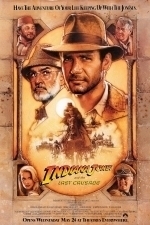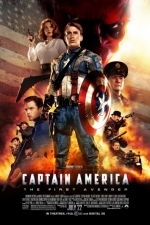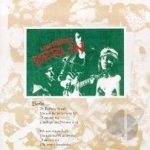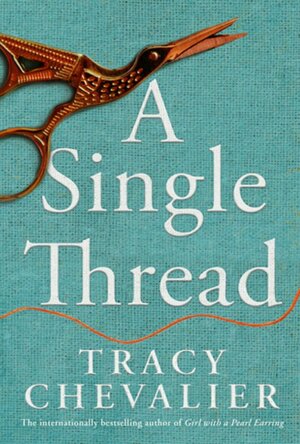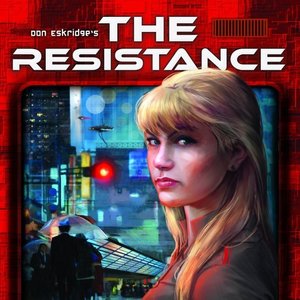Search
LeftSideCut (3776 KP) rated Indiana Jones and the Last Crusade (1989) in Movies
Jan 28, 2021
Returning to a much more balanced tone that the overly "cooky" Temple of Doom, the third Indiana Jones adventure gives Raiders of the Lost Ark some serious competition for best entry in the franchise (Raiders just about beats it for me based on the ratio of melting nazi face content).
The Last Crusade is a hugely entertaining movie from start to finish. It has a fantastic cast from the ever reliable Harrison Ford in the title role, to the convincingly menacing antagonist played by Julian Glover. Of course, Sean Connery is here for the ride this time around, as Indy's old man. The dynamic between Connery and Ford is great, and every scene with the two of them is cinema gold. Alison Doody makes for a welcome change with this films female protagonist (sort of), her character finally bucking the trend of typical love interest and having some depth, and a hell of a mean streak. Its nice to see John Rhys-Davies return from his ToD absence, and River Phoenix makes for an extremely memorable young Indiana in the movies opening flashback scene - on the subject of that scene, the transition from young Indy to Harrison Ford Indy is epic, thanks in part to another wonderful John Williams score, and is one of my highlights of the entire franchise!
The pacing is spot on - the over-two-hour runtime never once feels like a slog. The constant action is some of Spielberg's best work, and is suitably high octane. Everything in between boasts an engaging screenplay that develops all of the characters nicely, and the comedy elements are well done and sporadically placed, making the sillier moments genuinely funny (even the ridiculous Hitler scene)
All in all, The Last Crusade is a wonderful conclusion to the original trilogy, and is a genuinely fantastic adventure movie that stands toe to toe with the first film in its quality.
The Last Crusade is a hugely entertaining movie from start to finish. It has a fantastic cast from the ever reliable Harrison Ford in the title role, to the convincingly menacing antagonist played by Julian Glover. Of course, Sean Connery is here for the ride this time around, as Indy's old man. The dynamic between Connery and Ford is great, and every scene with the two of them is cinema gold. Alison Doody makes for a welcome change with this films female protagonist (sort of), her character finally bucking the trend of typical love interest and having some depth, and a hell of a mean streak. Its nice to see John Rhys-Davies return from his ToD absence, and River Phoenix makes for an extremely memorable young Indiana in the movies opening flashback scene - on the subject of that scene, the transition from young Indy to Harrison Ford Indy is epic, thanks in part to another wonderful John Williams score, and is one of my highlights of the entire franchise!
The pacing is spot on - the over-two-hour runtime never once feels like a slog. The constant action is some of Spielberg's best work, and is suitably high octane. Everything in between boasts an engaging screenplay that develops all of the characters nicely, and the comedy elements are well done and sporadically placed, making the sillier moments genuinely funny (even the ridiculous Hitler scene)
All in all, The Last Crusade is a wonderful conclusion to the original trilogy, and is a genuinely fantastic adventure movie that stands toe to toe with the first film in its quality.
Ryan Hill (152 KP) rated Captain America: The First Avenger (2011) in Movies
May 9, 2019
"i'm just a kid from brooklyn"
"I'm just a kid from Brooklyn"
A rip-roaring homage to old fashioned serials and comic books. Joe Johnston somehow pulls off the tone and look, firmly planting me into the 1940's time period. As fantastical as it is I still feel the real world within the picture.
Protagonist Steve Rogers makes for an easily likable guy who at the start is a smaller guy, who stands up to bullies even if it means getting his ass beat. His dream is to serve his country and although not meeting physical requirements for the army, he proves the heart and courage to become the specimen of a super soldier syrum. With this experiment, Steve's size, strength and conditioning is greatly enhanced and becomes the face of WW2 propaganda. His desire to fight however gets him involved with the battle against a division of the Nazi's known as Hydra, headed by Johann Schmidt, the "Red Skull".
Red Skull is one of the best villians of the Marvel cinematic universe. I couldn't imagine him played by anyone other than Hugo Weaving who brings such gravitas and personality to the role. Red Skull is an experiment of the soldier syrum himself which gives him a certain connection to Rogers, but chooses to use his power for the service of himself and his evil desires. The film includes the element of Nazi fascination with science and experimentation, taking it a step further. Red Skull discovers other worldly magic, the Tesseract of Asgard, which he utilizes for the use of weaponry. Thus, blending historical events with an exciting dose of imagination. A Nazi more powerful than Hitler? That's pretty scary.
The action comes swift and mighty, combining the fleshy violence of war with creative comic book thrills. It's some of the most entertaining action I've ever seen. I love that the presence of Hitler can be felt even though he is not on screen. It seamlessly connects the future with the past, makes the looming threat of the entire world felt, and contains elements of other Marvel films past and present that only adds to the movie and never detracts. Tony Stark's father has a direct influence on Captain America which adds a layer to the proceeding films. Thor and Loki's place in future events are tied in perfectly. Steve's friendship with Bucky and presumed death is one of the emotional cores to the film that also plays into the sequels. Unbelievable.
Can I just mention the charming romance between Peggy and Steve Rogers? It's so natural and plays out over the duration of the film without anything ridiculous. When Peggy tears up as Steve is speeding toward the unkown in a downed plane, I lose it. I lose it every time. They never got that last dance and my heart is broken.
When Red Skull calls Steve a "simpleton with a shield" I'm like YES!! that's why I love him. I could be Steve Rogers. I could be Captain America. Well, not really, but he's one of the most relatable on screen super heroes. I'd even say he's the one I can see myself in the most. Consider me #TeamCap.
I must make mention of the wonderful musical score and songs written for the film. Very important piece to the puzzle. I listen to "Star Spangled Man" just about every time I take a walk. The costumes and production design deserve all the love in the world as well. Tommy Lee Jones is great and makes me laugh as usual. All performances are great. Points for finding a use for Captain America's vintage comic book costume and re-enacting the punch to Hitler's face from Captain America issue #1.
Who taught Cap how to fight like that though? Guess that's one of the perks of the syrum too.
A rip-roaring homage to old fashioned serials and comic books. Joe Johnston somehow pulls off the tone and look, firmly planting me into the 1940's time period. As fantastical as it is I still feel the real world within the picture.
Protagonist Steve Rogers makes for an easily likable guy who at the start is a smaller guy, who stands up to bullies even if it means getting his ass beat. His dream is to serve his country and although not meeting physical requirements for the army, he proves the heart and courage to become the specimen of a super soldier syrum. With this experiment, Steve's size, strength and conditioning is greatly enhanced and becomes the face of WW2 propaganda. His desire to fight however gets him involved with the battle against a division of the Nazi's known as Hydra, headed by Johann Schmidt, the "Red Skull".
Red Skull is one of the best villians of the Marvel cinematic universe. I couldn't imagine him played by anyone other than Hugo Weaving who brings such gravitas and personality to the role. Red Skull is an experiment of the soldier syrum himself which gives him a certain connection to Rogers, but chooses to use his power for the service of himself and his evil desires. The film includes the element of Nazi fascination with science and experimentation, taking it a step further. Red Skull discovers other worldly magic, the Tesseract of Asgard, which he utilizes for the use of weaponry. Thus, blending historical events with an exciting dose of imagination. A Nazi more powerful than Hitler? That's pretty scary.
The action comes swift and mighty, combining the fleshy violence of war with creative comic book thrills. It's some of the most entertaining action I've ever seen. I love that the presence of Hitler can be felt even though he is not on screen. It seamlessly connects the future with the past, makes the looming threat of the entire world felt, and contains elements of other Marvel films past and present that only adds to the movie and never detracts. Tony Stark's father has a direct influence on Captain America which adds a layer to the proceeding films. Thor and Loki's place in future events are tied in perfectly. Steve's friendship with Bucky and presumed death is one of the emotional cores to the film that also plays into the sequels. Unbelievable.
Can I just mention the charming romance between Peggy and Steve Rogers? It's so natural and plays out over the duration of the film without anything ridiculous. When Peggy tears up as Steve is speeding toward the unkown in a downed plane, I lose it. I lose it every time. They never got that last dance and my heart is broken.
When Red Skull calls Steve a "simpleton with a shield" I'm like YES!! that's why I love him. I could be Steve Rogers. I could be Captain America. Well, not really, but he's one of the most relatable on screen super heroes. I'd even say he's the one I can see myself in the most. Consider me #TeamCap.
I must make mention of the wonderful musical score and songs written for the film. Very important piece to the puzzle. I listen to "Star Spangled Man" just about every time I take a walk. The costumes and production design deserve all the love in the world as well. Tommy Lee Jones is great and makes me laugh as usual. All performances are great. Points for finding a use for Captain America's vintage comic book costume and re-enacting the punch to Hitler's face from Captain America issue #1.
Who taught Cap how to fight like that though? Guess that's one of the perks of the syrum too.
BookwormMama14 (18 KP) rated Maggie Bright: A Novel of Dunkirk in Books
Jan 2, 2019
The entire history of the world is about to change as Hitler marches his troops across Europe. Can the actions of one person make a difference?
Clare Childs has mysteriously inherited the Maggie Bright. Her suspicions that Maggie holds a secret are proven when a thief comes aboard. Clare is suddenly thrown into the middle of a Scotland Yard investigation that could finally expose one of Hitler's darkest schemes. While on the other side of the channel, Private Jamie Elliot has been tasked with the mission of returning a wounded captain home. The captain has suffered a head injury and the only words he speaks are quotes from John Milton's Paradise Lost. When Churchill calls for civilians to help rescue the stranded British Army from Dunkirk, Clare knows that Maggie must go. Piloted by William Percy, a detective inspector and Murray Vance, a world renowned cartoonist, the Maggie Bright goes to war.
“You can never get a cup of tea large enough or a book long enough to suit me.” - C.S. Lewis
Never have these words rung more true for me than when I finished reading Maggie Bright. I wish the story would go on and on. I absolutely love reading about World War II. There is so much evil during this period, but there is also hope and light. Nations coming together with a singular purpose. Fighting and dying side by side. I am ashamed to admit that most of my knowledge of WWII begins with D-Day and America's involvement. My eyes have been opened wide with England's trials at the beginning of the war. I cried four times while reading this book! The horror is real, the fight unbearable, yet the men and women who sacrificed everything did so for us today. So that we might have hope and know that no matter how dark things become, we shall press on to victory.
"God towards thee hath done his part, do thine" - John Milton, Paradise Lost
I received a free copy of Maggie Bright from Tyndale House Publishers in exchange for my honest review.
Clare Childs has mysteriously inherited the Maggie Bright. Her suspicions that Maggie holds a secret are proven when a thief comes aboard. Clare is suddenly thrown into the middle of a Scotland Yard investigation that could finally expose one of Hitler's darkest schemes. While on the other side of the channel, Private Jamie Elliot has been tasked with the mission of returning a wounded captain home. The captain has suffered a head injury and the only words he speaks are quotes from John Milton's Paradise Lost. When Churchill calls for civilians to help rescue the stranded British Army from Dunkirk, Clare knows that Maggie must go. Piloted by William Percy, a detective inspector and Murray Vance, a world renowned cartoonist, the Maggie Bright goes to war.
“You can never get a cup of tea large enough or a book long enough to suit me.” - C.S. Lewis
Never have these words rung more true for me than when I finished reading Maggie Bright. I wish the story would go on and on. I absolutely love reading about World War II. There is so much evil during this period, but there is also hope and light. Nations coming together with a singular purpose. Fighting and dying side by side. I am ashamed to admit that most of my knowledge of WWII begins with D-Day and America's involvement. My eyes have been opened wide with England's trials at the beginning of the war. I cried four times while reading this book! The horror is real, the fight unbearable, yet the men and women who sacrificed everything did so for us today. So that we might have hope and know that no matter how dark things become, we shall press on to victory.
"God towards thee hath done his part, do thine" - John Milton, Paradise Lost
I received a free copy of Maggie Bright from Tyndale House Publishers in exchange for my honest review.
PO
Panzer Operations: Germany's Panzer Group 3 During the Invasion of Russia, 1941
Book
This book, originally published in German in 1956, has now been translated into English, unveiling a...
Ian McCulloch recommended Berlin by Lou Reed in Music (curated)
ClareR (6054 KP) rated A Single Thread in Books
Sep 12, 2019
A wonderful book!
A Single Thread is set in the period after World War 1, just before Hitler takes power in Germany. Violet Speedwell is a ‘surplus woman’, and so she is expected to live out her life caring for her ageing, cantankerous mother, and throwing herself on the mercy of her brother as she ages. However, Violet isn’t prepared to live her life like this. She manages to get a transfer from her job in Southampton to their Winchester offices. Life isn’t easy for Violet, and she lives off sandwiches and tea in her rented room. By chance, she finds herself in Winchester Cathedral on the day of the Society of Broderers service, where the embroidered kneelers and cushions are blessed and placed in the cathedral for the public to use. Violet finds herself drawn to the embroidery, and even though she has no experience, she becomes involved in the group.
I loved the descriptions of the embroidery: the different stitches, the colours, the camaraderie and friendships that Violet makes with Gilda and Miss Pesel (who incidentally, really existed - and what a life SHE had!). Who knew that embroidery and campanology (bell-ringing) could be so interesting?! Violet becomes very interested in bell-ringing - whether that’s because of the actual bell-ringing, or the fatherly Arthur who she falls in love with, I’m not quite sure.
I thought the social attitudes of the time were really well portrayed. ‘Spare women’ weren’t regarded very favourably, but this was something completely out of their control: so many young men had been killed during the war, that there just weren’t enough men to go round. And when some women found love with one another, they were ostracised and ridiculed. It’s good to see that we have moved on in some ways.
Anyway, I loved this book. It’s not just about embroidery and campanology, and I think that any reader will be pleasantly surprised at how interesting Tracy Chevalier makes these things! It’s a social commentary, a love story, a story about friendship and passion: of the man/ woman, woman/ woman and hobbies varieties. And I wouldn’t hesitate to recommend it.
I loved the descriptions of the embroidery: the different stitches, the colours, the camaraderie and friendships that Violet makes with Gilda and Miss Pesel (who incidentally, really existed - and what a life SHE had!). Who knew that embroidery and campanology (bell-ringing) could be so interesting?! Violet becomes very interested in bell-ringing - whether that’s because of the actual bell-ringing, or the fatherly Arthur who she falls in love with, I’m not quite sure.
I thought the social attitudes of the time were really well portrayed. ‘Spare women’ weren’t regarded very favourably, but this was something completely out of their control: so many young men had been killed during the war, that there just weren’t enough men to go round. And when some women found love with one another, they were ostracised and ridiculed. It’s good to see that we have moved on in some ways.
Anyway, I loved this book. It’s not just about embroidery and campanology, and I think that any reader will be pleasantly surprised at how interesting Tracy Chevalier makes these things! It’s a social commentary, a love story, a story about friendship and passion: of the man/ woman, woman/ woman and hobbies varieties. And I wouldn’t hesitate to recommend it.
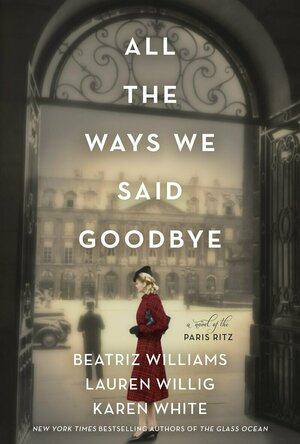
All the Ways We Said Goodbye
Karen White, Beatriz Williams and Lauren Willig
Book
The heiress . . . The Resistance fighter . . . The widow . . . Three women whose fates are joined...
Sophia (Bookwyrming Thoughts) (530 KP) rated Becoming Darkness in Books
Jan 23, 2020
<b><i>I received this book for free from Publisher in exchange for an honest review. This does not affect my opinion of the book or the content of my review.</i></b>
Never have I ever read a book in which Hitler won World War II and succeeded in taking over the world.
Until now. I admit I'm a little fond of this one because of the whole alternative history thing going on right there, but I'm a little disturbed here, Lindsay Francis Brambles. You're as bad as Agatha Christie and came very close to killing everyone. Although technically, you did kill most of the characters that I grew fond of. Not cool. I don't think I can ever forgive you for this transgression of Trigger Happy Book. (More like Explosion Happy Book.)
But in the very long run, I only liked <i>Becoming Darkness</i> for a few things.
Sadistic as it may be, I did like how Brambles made Hitler won the second world war and unleashed a virus that made a lot of people turn into vampires all of that is told within the first few pages. Although the origins of Gemorrah (le virus) is revealed throughout the story and integrated in the plot, I still don't understand how the creators came up with that name in the first place. Does it mean something in German, or is it something they thought sounded sinister and cool and decided to go with it? In my humble opinion, it does not sound cool or sinister. It sounds like a Mary Poppins word.
I also really liked how Brambles didn't go completely off course from history there are some references to the war, there might be another significant historical figure who makes a cameo appearance (under a different name, but don't quote me), etc. Basically, there's not much that's thrown in completely off kilter aside from maybe the virus I still feel fishy about that.
Sophie Harkness does not take BS when there are boys hitting on her in the stupidest, cheesiest ways. Namely: "We're meant for one another because you're a girl, I'm a guy, and we have the parts to create phenomenal offspring." Sorry for the disturbing image, but that was very much implied by the character. Unfortunately for her, she sort of believes in love at first sight when she first met Val back when she was fourteen.
Sophie is also not a judgmental character she's very open-minded and believes vampires aren't exactly sinister blood sucking creatures. Every other Immune, those who can't get Gemorrah, are so judgmental and narrow-minded, it just peeves me greatly. It IS understandable, though, considering the year Brambles sets the book in.
Unfortunately, I didn't really like the whole flashbacks. For awhile in the beginning, it's a little confusing and I had to backtrack to make sure it was a flashback and not actually set in the present day. There's a "sort-of" warning and then we're in flashback mode that feels like it's set in the present but is really Sophie telling a story. On the bright side, all those flashbacks (and the journal entries written by Sophie's mom) all play a relevant role in the overall plot.
I also didn't really like Valentine. Though I eventually warmed up to him over the course of the book, something about him was really disturbing. He's not an annoying "stalker type" of character, but it IS a little weird he still tried to keep his connections to Sophie's family from grandma to mom to Sophie in the hopes of falling in love again. But considering the fact he's doesn't throw out stupidly cheesy lines at Sophie, I like him a little.
Have I mentioned I'm sick and tired of seeing the name Valentine over and over again in literature? We just can't get any more original than St. Valentine, can we?
I would totally summarize <i>Becoming Darkness</i> in a few words if only I didn't end up giving major spoilers. But in a nutshell, the book quite literally tells me all of us should be downright grateful the Third Reich didn't succeed. It also told me I'm royally screwed if the way to a man's heart is through his stomach, but I think I've established that in sixth grade with the whole Ramen Noodle Stove catastrophe.
<a href="https://bookwyrmingthoughts.com/arc-review-becoming-darkness-by-lindsay-francis-brambles/"; target="_blank">This review was originally posted on Bookwyrming Thoughts</a>
Never have I ever read a book in which Hitler won World War II and succeeded in taking over the world.
Until now. I admit I'm a little fond of this one because of the whole alternative history thing going on right there, but I'm a little disturbed here, Lindsay Francis Brambles. You're as bad as Agatha Christie and came very close to killing everyone. Although technically, you did kill most of the characters that I grew fond of. Not cool. I don't think I can ever forgive you for this transgression of Trigger Happy Book. (More like Explosion Happy Book.)
But in the very long run, I only liked <i>Becoming Darkness</i> for a few things.
Sadistic as it may be, I did like how Brambles made Hitler won the second world war and unleashed a virus that made a lot of people turn into vampires all of that is told within the first few pages. Although the origins of Gemorrah (le virus) is revealed throughout the story and integrated in the plot, I still don't understand how the creators came up with that name in the first place. Does it mean something in German, or is it something they thought sounded sinister and cool and decided to go with it? In my humble opinion, it does not sound cool or sinister. It sounds like a Mary Poppins word.
I also really liked how Brambles didn't go completely off course from history there are some references to the war, there might be another significant historical figure who makes a cameo appearance (under a different name, but don't quote me), etc. Basically, there's not much that's thrown in completely off kilter aside from maybe the virus I still feel fishy about that.
Sophie Harkness does not take BS when there are boys hitting on her in the stupidest, cheesiest ways. Namely: "We're meant for one another because you're a girl, I'm a guy, and we have the parts to create phenomenal offspring." Sorry for the disturbing image, but that was very much implied by the character. Unfortunately for her, she sort of believes in love at first sight when she first met Val back when she was fourteen.
Sophie is also not a judgmental character she's very open-minded and believes vampires aren't exactly sinister blood sucking creatures. Every other Immune, those who can't get Gemorrah, are so judgmental and narrow-minded, it just peeves me greatly. It IS understandable, though, considering the year Brambles sets the book in.
Unfortunately, I didn't really like the whole flashbacks. For awhile in the beginning, it's a little confusing and I had to backtrack to make sure it was a flashback and not actually set in the present day. There's a "sort-of" warning and then we're in flashback mode that feels like it's set in the present but is really Sophie telling a story. On the bright side, all those flashbacks (and the journal entries written by Sophie's mom) all play a relevant role in the overall plot.
I also didn't really like Valentine. Though I eventually warmed up to him over the course of the book, something about him was really disturbing. He's not an annoying "stalker type" of character, but it IS a little weird he still tried to keep his connections to Sophie's family from grandma to mom to Sophie in the hopes of falling in love again. But considering the fact he's doesn't throw out stupidly cheesy lines at Sophie, I like him a little.
Have I mentioned I'm sick and tired of seeing the name Valentine over and over again in literature? We just can't get any more original than St. Valentine, can we?
I would totally summarize <i>Becoming Darkness</i> in a few words if only I didn't end up giving major spoilers. But in a nutshell, the book quite literally tells me all of us should be downright grateful the Third Reich didn't succeed. It also told me I'm royally screwed if the way to a man's heart is through his stomach, but I think I've established that in sixth grade with the whole Ramen Noodle Stove catastrophe.
<a href="https://bookwyrmingthoughts.com/arc-review-becoming-darkness-by-lindsay-francis-brambles/"; target="_blank">This review was originally posted on Bookwyrming Thoughts</a>
MStykal (3 KP) rated The Resistance in Tabletop Games
Nov 20, 2018
Excellent intro into social deduction games (3 more)
Easy to teach
Creates interesting moments
High player count
Component quality is lacking (3 more)
Seriously effected by the metagame (i.e. you were a spy last game, you're a spy this game)
Outshined by other, more impressive games.
Puts introverted players in awkward situations.
Good... Until it's not
First off... I love this game. I've had some of the best moments in my gaming history playing this game. It's a simple, quick, satisfying game of bluffing and lying to your friends. But... I'm a good liar. I'm not in the camp of "This game is broken" or "I'm too good at this so it's not fun", because neither of those are true. And maybe my lack of appreciation comes from spending hours playing this over and over early on in my collections history. But truth be told, there are better games that do everything this does and more. This is a good entrance point for people into social deduction games. Unfortunately, it makes introverted people uncomfortable when another, louder, more confident gamer is shouting about something. To be honest, that's the issue with the whole genre, but this is often the starting off point that sullies more involved games for some players. Games like Burke's Gambit, which is similar but with more things players can do. Avalon, which is this game with more in depth roles. One Night Ultimate Werewolf/Alien/Vampire, which is a lot of the same but with an app to moderate it and interesting and plentiful player powers. Secret Hitler, which if you can get past the theme, is amazing, and brings the same feel but with more choices and consequences for your actions.
The Resistance is a fine game. It's only great or good until your group has built up such a metagame that it's not great or good anymore. But then something surprises you and it's back up there. Until you play with a different group. Until you play a different game. Until you evolve naturally past The Resistance into another similar game. I'd always recommend this to new gamers. Because it's a good game... Until... It's not good anymore. Then it's always there for a new friend coming to play. For a session with the new players. It's a good game... Until... It's not.
The Resistance is a fine game. It's only great or good until your group has built up such a metagame that it's not great or good anymore. But then something surprises you and it's back up there. Until you play with a different group. Until you play a different game. Until you evolve naturally past The Resistance into another similar game. I'd always recommend this to new gamers. Because it's a good game... Until... It's not good anymore. Then it's always there for a new friend coming to play. For a session with the new players. It's a good game... Until... It's not.

A Arte da Guerra Sun Tzu
Book
App
Descrição: Sun Tsu um filosofo que se tornou general mostra neste livro que dominar " A Arte da...
